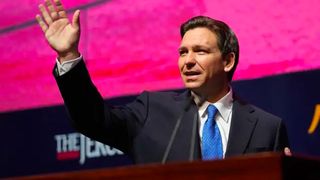With the long-awaited and awkward crash landing of Florida Governor Ron DeSantis’ presidential announcement, we stare down a whole new series of questions about what could happen before next November. Is DeSantis a more electable candidate than Donald Trump? Can he magically pry away Trump’s loyal base to win the primaries and then nimbly change tact to persuade a new cohort of voters to win the general in November? Does DeSantis’ politics work outside of Florida? Why does Trump keep calling him ‘meatball Ron’?
In a time where the word ‘unprecedented’ is becoming less and less unprecedented as a descriptor of US politics, the dissatisfying answer to all the new questions cropping up around DeSantis’ presidential run is: we just do not know. And, being a little over 38 weeks away from Super Tuesday and over 500 days away from the 2024 presidential election, I dare not try and make a prediction.
So, in a reach for predictability and to attempt to answer what a DeSantis presidency means for Australia, the question we need to ask is what would a hypothetical DeSantis presidency mean for US foreign policy and the US view of its role in the world? To answer that, we need to do exactly what DeSantis has done to secure his victories in the past: look to President Trump.
DeSantis soared to re-election as Florida’s governor by almost twenty percentage points in November 2022, securing the largest Republican victory in Florida for forty years in the process. So much of DeSantis’ success, from his razor-thin first election victory in 2018 to his signature on over eighty new laws just this Spring (unprecedented!), to his second election victory in 2022, were in no small part thanks to endorsements by President Trump and his close alignment to Trump’s playbook — co-opting everything from Trump’s policy positions all the way down to hand gestures and his Fox News appearances.
While DeSantis’ domestic agenda is well documented — an antagonistic run sheet of policies designed to attack “the woke mind virus” — despite serving in the House Foreign Affairs Committee for six years, his personal record on foreign policy and convictions on world affairs are murky at best. Even as the Governor has attempted to make clear his position on Ukraine in a recent controversy where he called the war in Ukraine a “territorial dispute” that is not “a vital American national strategic interest”, his position is a notable backflip on his 2015 criticisms of Obama’s “weak” response to Russia’s annexation of Crimea.
Borrowing from Trump’s playbook, a DeSantis presidency for Australia could mean much more of the ‘America First’ posture we experienced with the Trump administration between 2017 and 2021. Considering how rarely foreign policy features in the calculus of American voters in primary elections let alone the general, and in lieu of any obvious personal conviction to a foreign policy platform — aside from once promising to be the “most pro-Israel governor in America” — DeSantis is unlikely to devote energy distinguishing himself from Trump when the former President’s tried and true clarion call of “America First” which has resonated so successfully with both Republicans and Democratic voters.
This trend of isolationism in Republican politics, which United States Studies Centre polling implies has been rusted on since 2019, is tied to the popular parts of Trump’s 2016 presidential election policies which remain the surest bet of securing the needed votes of the party’s primary base. In fact, United States Studies Centre polling from September 2022 shows that asked if America should engage in world affairs, the plurality, almost half (46 per cent) of Trump voters think the US should not concern itself with the affairs of the world and stay at home.
It is worth remembering that this is quite the pivot for the Republican party. It was not that long ago that Republican presidents were at the forefront of US foreign policies that espoused strong international engagement as inherent to US national identity, world leadership and the nation’s security. It was less than twenty years ago in President Bush’s second inauguration speech that the president argued “the survival of liberty in our land increasingly depends on the success of liberty in other lands”. Now, Republicans are much more likely to share DeSantis’ retort in his book The Courage to be Free: “I remember being stunned. Does the survival of American liberty depend on whether liberty succeeds in Djibouti?”
Responding to this new trend of isolationism, the Republican party needs to try braiding the incompatible threads of ‘America First’ policies, the party’s own history of decisively not-America-first foreign policymaking and the need to address new developments in the world that see a greater demand for US engagement, like Russia’s invasion of Ukraine.
This sort of soul-searching is often decades in the making and will not receive the kind of tender love and attention required to resolve these questions before the general election in November. So, for now, perhaps our best search for answers in a hypothetical presidency of DeSantis is to look for precedence in Trump’s presidency. Although, I dare not make a prediction.






